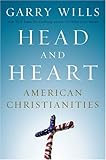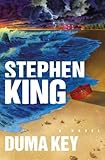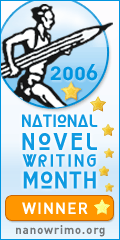Wednesday, January 07, 2009
 Head and Heart: American Christianities by Garry Wills
Head and Heart: American Christianities by Garry WillsMy review
rating: 4 of 5 stars
This was a sophisticated history of the Christian faith in the United States, and how it has influenced culture and politics. Wills' premise is that America has had two main strains of Christianity: Enlightment (head) and evangelical (heart). They reached synthesis at key points in our history, namely to oppose slavery and fight for civil rights for African Americans and other minorities.
The early chapters are a bit of a slog -- it's hard to keep track of all the Puritan offshoots and leaders, and Wills assumes a lot of knowledge on the part of the casual reader. The book is most entertaining when Wills examines Transcendatlism, religion and the Civil War and the evangelical awakening in the early part of the 20th century.
View all my reviews.
Labels: criticism, Gary Wills
Sunday, November 16, 2008
 The Omnivore's Dilemma by Michael Pollan
The Omnivore's Dilemma by Michael PollanMy review
rating: 3 of 5 stars
I really loved this book, until I hit the last three chapters, which is where an editor needed to have stepped in to say "Enough with the mystical properties of wild mushrooms already."
Still, this was an incredibly well-written, thoughtful citique of modern American eating habits, and the political, social and economic forces that have shaped them.
View all my reviews.
Labels: criticism, Michael Pollan
 The Shining by Stephen King
The Shining by Stephen KingMy review
rating: 4 of 5 stars
This is one of those books that I'm glad I read after seeing the film adaptation. I wouldn't have enjoyed Stanley Kubrick's movie version nearly as much had I read the book first.
Stephen King, you may know, was not too pleased with Kubrick's adaptation. For one, he thought Jack Nicholson's interpretation of the character of Jack Torrance left little doubt that he would go insane and try to murder his family. When we meet him, he seems halfway there already.
Indeed, Jack Torrance was a far more complex character in the novel, and the film by necessity dispensed with much of his backstory. Jack Torrance of the film was clearly ill-suited for domestic life, and barely cared to conceal it. The Torrance of the novel, however, was a loving father who wanted to be a good husband. Nonetheless, he was beset by demons that cost him his job, and it was out of desperation that he agreed to become the caretaker for the Overlook Hotel.
In the book, Jack Torrance struggled against insanity, but was overcome by the hotel's malignant power. This was a tragedy in the novel; in the film, it was the subject of black comedy. Torrance was merely a horror film monster that had to be evaded and destroyed. I do give the film credit, however, for providing a more chilling ending than the book. At the end of the novel, the hotel was destroyed, its evil laid to rest. But in the film, it lived to fight another day, and Jack Torrance had become part of its dark history.
View all my reviews.
Labels: criticism, Stephen King
 A Drink Before the War by Dennis Lehane
A Drink Before the War by Dennis LehaneMy review
rating: 3 of 5 stars
This is the first book in the Kenzie-Genarro series, but I actually read it after I read Gone Baby Gone, which I enjoyed much more than this one. Perhaps because Lehane had already introduced his characters, he wasted much less time in exposition and backstory. I found the background about Kenzie's father tiresome, and it lacked the emotional resonance that Lehane no doubt intended. The book also seemed preachy.
Nonetheless, Lehane knows how to tell a story, and this one zipped right along.
View all my reviews.
Labels: criticism, Dennis Lehane
Wednesday, July 23, 2008
 Duma Key by Stephen King
Duma Key by Stephen KingMy review
rating: 4 of 5 stars
This may not have been Stephen King's best novel, but it's up there, and it's going to stick with me for a long time. Like many of King's recent works, the book is not so much terrifying as emotionally haunting; it is full of suspense and a heaping dose of the supernatural, but its power comes from its exploration of human grief and suffering.
Faithful readers will appreciate some of the nods King makes to his other books, though some are familiar to me from their film adaptations. (For example, there's a line that seems lifted almost straight from "Stand By Me" and there are refernces familar from "The Shawshank Redemption.") The evil China figurine Perse reminds me of the can toi from "The Dark Tower" series as well as "Desperation", but I'll need to spend some quality time on Wikipedia exploring those links.
Bottom line, King will fans will love this, but like Bag of Bones and Hearts in Atlantis, I'd recommend it as well to those who have never read him. He once again proves his chops as a writer of serious literature.
View all my reviews.
Labels: criticism, Stephen King
Wednesday, June 11, 2008
I recently watched the cinematic adaptation of P.D. James' "Children of Men", a dystopian novel set in a future in which the entire human race has become infertile. This may be one of those films that I would have appreciated more had I not read the book ahead of time. It was well-made but the story, which departed significantly from the source material, seemed flat in comparison to the book.
For one thing, the novel tells a much richer story, with deeper characterization. The film, which came in at just under two hours, probably could have spent more time developing a backstory. The novel is full of details that provide a vivid and poignant picture of a world without children, one in which society is slowly dying. James alternates chapters between the third-person and the first-person perspective of her protagonist, Theo. This allows us to imagine the novel's decaying England through Theo's eyes and to learn all there is to know about him, much of it unpleasant. We barely get acquainted with the Theo of the film before he is thrust into action, becoming involved with a revolutionary group that is sheltering the first woman to bear a child in a generation.
All told, the novel is sadder and darker, with a less likeable hero and a more ambigious ending. In the film, England is ruled by an openly repressive regime whose jack-booted enforcers operate with impunity. The tyranny of the government in the novel is hidden by a veneer of paternalistic benevolence, which makes it seem somehow more insidious and chilling. "Children of Men" was one the best books I've read in the past year. The film was entertaining but ultimately forgettable.
For one thing, the novel tells a much richer story, with deeper characterization. The film, which came in at just under two hours, probably could have spent more time developing a backstory. The novel is full of details that provide a vivid and poignant picture of a world without children, one in which society is slowly dying. James alternates chapters between the third-person and the first-person perspective of her protagonist, Theo. This allows us to imagine the novel's decaying England through Theo's eyes and to learn all there is to know about him, much of it unpleasant. We barely get acquainted with the Theo of the film before he is thrust into action, becoming involved with a revolutionary group that is sheltering the first woman to bear a child in a generation.
All told, the novel is sadder and darker, with a less likeable hero and a more ambigious ending. In the film, England is ruled by an openly repressive regime whose jack-booted enforcers operate with impunity. The tyranny of the government in the novel is hidden by a veneer of paternalistic benevolence, which makes it seem somehow more insidious and chilling. "Children of Men" was one the best books I've read in the past year. The film was entertaining but ultimately forgettable.
Labels: "Children of Men", film adaptations, P.D. James
Wednesday, April 09, 2008
My co-worker and fraternity brother Val Brkich is organizing a book festival this summer in Bridgewater, Beaver County. More info is here.
Labels: book festivals
Thursday, April 03, 2008
Tuesday, March 11, 2008
I just read "The Shining" (spoilers ahead), and it's one of those books, which I've discussed before, that I'm glad I read after seeing the film adaptation. I wouldn't have enjoyed Stanley Kubrick's movie version nearly as much had I read the book first.
Stephen King, you may know, was not too pleased with Kubrick's adaptation. For one, he thought Jack Nicholson's interpretation of the character of Jack Torrance left little doubt that he would go insane and try to murder his family. When we meet him, he seems halfway there already.
Indeed, Jack Torrance was a far more complex character in the novel, and the film by necessity dispensed with much of his backstory. Jack Torrance of the film was clearly ill-suited for domestic life, and barely cared to conceal it. The Torrance of the novel, however, was a loving father who wanted to be a good husband. Nonetheless, he was beset by demons that cost him his job, and it was out of desperation that he agreed to become the caretaker for the Overlook Hotel.
In the book, Jack Torrance struggled against insanity, but was overcome by the hotel's malignant power. This was a tragedy in the novel; in the film, it was the subject of black comedy. Torrance was merely a horror film monster that had to be evaded and destroyed. I do give the film credit, however, for providing a more chilling ending than the book. At the end of the novel, the hotel was destroyed, its evil laid to rest. But in the film, it lived to fight another day, and Jack Torrance had become part of its dark history.
Stephen King, you may know, was not too pleased with Kubrick's adaptation. For one, he thought Jack Nicholson's interpretation of the character of Jack Torrance left little doubt that he would go insane and try to murder his family. When we meet him, he seems halfway there already.
Indeed, Jack Torrance was a far more complex character in the novel, and the film by necessity dispensed with much of his backstory. Jack Torrance of the film was clearly ill-suited for domestic life, and barely cared to conceal it. The Torrance of the novel, however, was a loving father who wanted to be a good husband. Nonetheless, he was beset by demons that cost him his job, and it was out of desperation that he agreed to become the caretaker for the Overlook Hotel.
In the book, Jack Torrance struggled against insanity, but was overcome by the hotel's malignant power. This was a tragedy in the novel; in the film, it was the subject of black comedy. Torrance was merely a horror film monster that had to be evaded and destroyed. I do give the film credit, however, for providing a more chilling ending than the book. At the end of the novel, the hotel was destroyed, its evil laid to rest. But in the film, it lived to fight another day, and Jack Torrance had become part of its dark history.
Labels: "The Shining", film adaptations, Stephen King

